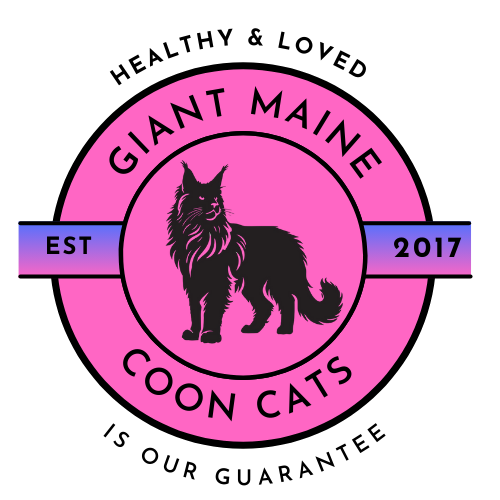
A heartfelt and honest guide for breeders who truly care.
How to Ethically Breed Maine Coons (While Keeping Size in Mind)

Breeding Maine Coons
Let’s Start with What Really Matters
Breeding Maine Coons — especially when you’re focused on preserving their impressive size — is about a lot more than just genetics or looks. It’s about responsibility. Stewardship. It’s about protecting a bloodline and a soul line — knowing that every cat born under your roof deserves a life of health, love, and dignity.
And when it comes to size, yes, it’s one of the most jaw-dropping traits these majestic cats carry — but it should never come at the cost of their wellbeing. Bigger doesn’t always mean better. Healthy and large? Now that’s the goal.
So here’s a real-world breakdown on how to ethically breed these gentle giants with size in mind — without compromising their health, personality, or the ethics of what it means to bring new life into the world.
1. Start with Deep Lineage Knowledge — Not Just Big Numbers
If size is your focus, the temptation might be to breed “the biggest male to the biggest female.” But real breeders know it’s more nuanced than that. True size comes not just from one generation, but from the entire genetic foundation behind the cat. You have to go deep.
Study multiple generations of a cat’s lineage — not just weight, but bone structure, length, ear set, and tail proportion.
Understand which bloodlines carry consistent size vs. random outliers.
Avoid cats that are large but carry HCM, hip dysplasia, or early kidney issues. A big cat that’s in pain is not a win.
Sometimes the more modest-sized, slow-maturing lines produce healthier, longer-lived giants in the long run. Play the long game.
2. Health Testing Is Non-Negotiable
Ethical breeding begins and ends with rigorous health testing. Not just because it protects your buyers — but because it protects the cats you’re creating. These cats trust us. We owe it to them.
Minimum recommended tests before breeding:
HCM (Hypertrophic Cardiomyopathy) via DNA and echocardiogram (annually if possible)
PKD (Polycystic Kidney Disease) screening
SMA (Spinal Muscular Atrophy)
Hip & joint X-rays — especially with larger-boned cats
FIV/FeLV tests
Full vet exams, heart auscultation, and dental checks
No shortcuts. No excuses. A large cat with hidden heart disease is a heartbreak waiting to happen.
3. Personality Matters Just as Much as Size
What makes a Maine Coon truly magical isn’t just the size — it’s the soul. The gentle, goofy, dog-like charm that people fall in love with. Don’t lose that by breeding only for looks.
Prioritize cats with confident, affectionate, curious temperaments.
Avoid breeding anxious, aggressive, or reclusive cats — behavior is just as heritable as bone mass.
Socialize your kittens in a home, not a cage. Handle them daily. Let them know humans = love.
Big is beautiful. But sweet and stable is what keeps families bonded to their cats for life.
4. Don’t Rush the Growth — or the Breeding
Maine Coons are slow-maturing cats. They can take up to 4–5 years to fully develop their adult mass, ruff, and frame. Respect that timeline.
Avoid breeding before 18 months — ideally 2 years for queens and even longer for males.
Don’t overbreed your females. One to two litters per year, with rest and recovery between.
Use supplements like omega-3s, taurine, and glucosamine to support healthy growth and joint development, but skip the overfeeding. You’re not trying to force size — you’re nurturing it naturally.
A big cat should also be a balanced cat — not overweight, not bloated, but proportioned and strong.
5. Be Transparent, Selective, and Hands-On With Placements
Ethical breeding continues after the kitten goes home.
Be brutally honest about your lines — size potential, temperament, health risks.
Vet your buyers. Make sure they understand the commitment of a 20-lb cat who might cost more to feed, groom, and carry.
Provide support for life. Stay available. Keep in touch. Offer rehoming help if needed.
This is how you build a legacy. Not just a business.
6. Use Your Platform to Educate, Not Just Sell
There’s so much misinformation online — about “giant” Maine Coons, fake sizes, or unethical breeders chasing viral videos. Be the exception.
Share real weights, not exaggerated ones.
Talk about the value of slow growth and good genes over forced feeding or “designer” extremes.
Teach buyers how to feed, care for, and appreciate these cats beyond just size.
Being ethical means stepping into the role of guardian, not just seller.
Final Thoughts: Size With Soul
You can absolutely breed Maine Coons that are big, breathtaking, and still beautifully healthy — but it takes time, integrity, and heart. It means knowing when to say no to a pairing. It means loving your animals more than your brand. And it means standing for something bigger than hype.
These cats trust us with their lives. The least we can do is raise them with the same devotion they give so freely.
Breed big. But breed with love. That’s how you build something that lasts.
